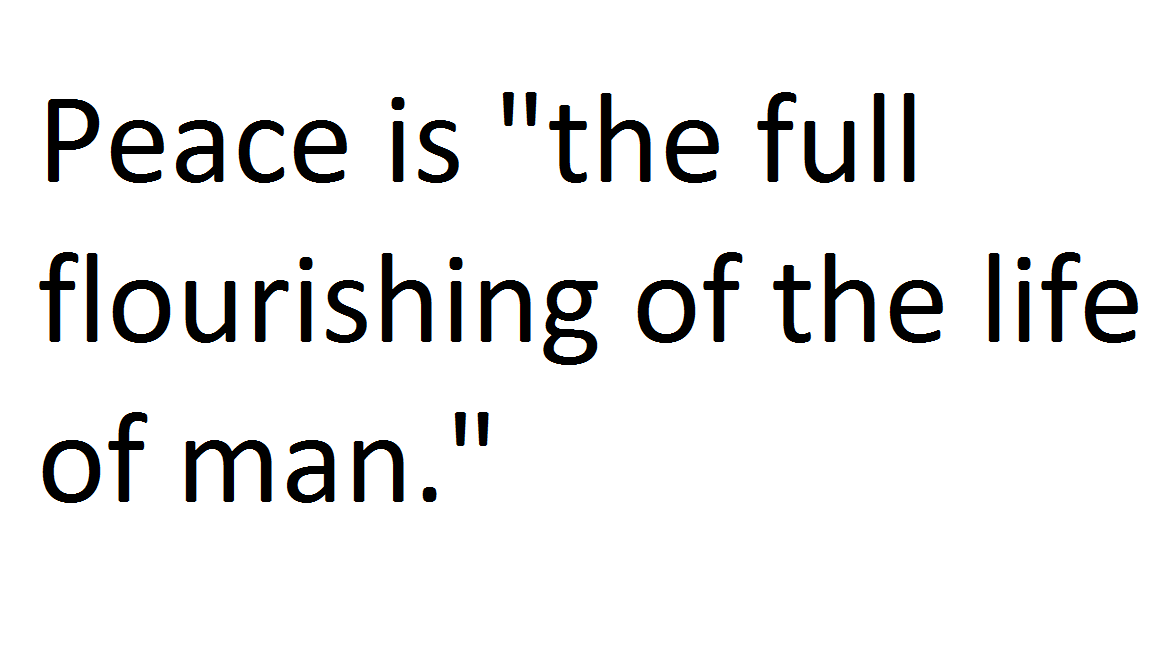Blessed are the peacemakers, for they shall be called sons of God. (Mt 5:9)
The blessedness of the peacemakers is the reward of adoption, “they shall be called the sons of God.” For God is our common parent, and no other way can we pass into His family than by living in brotherly love together. (St. Hilary of Poitiers)
The implication here is clear: those who make peace will be called sons of God, and those who don’t, won’t. But it’s worth asking, what is meant by “peace” here? In what does this peace consist?
In his book on the Beatitudes, the Dominican theologian Servais Pinckaers considers the various meanings of peace in the Bible and then distinguishes two different kinds of peace, cowardly peace and noble peace:
Cowardly peace is filled with fear. It avoids struggle and danger and shows lassitude in the face of effort and commitment. It is external and is established by means of concession, evasion, and compromise. It is peace at any price, without moral cost. The man of cowardly peace is incapable of simply saying yes or no, taking a clear stand and sticking to it, and assuming responsibility to the end. Under the pretext of dialogue, and for lack of courage, he always delays his decisions.
Pinckaers uses fairly strong words here, but his point remains: this kind of peace is called peace in the same way that simply not hating someone is called love. It simply doesn’t convey what the full meaning of the word is meant to convey. About the other kind of peace, noble peace, he writes:
What I call a noble peace is that high ideal which gives meaning and richness to human life. It calls for personal commitment and a clear response to the appeal of truth, justice, and generous love. In contrast with the false prophets of facile spontaneity and endless dialogue, the man of noble peace does not draw back from renunciations and sacrifices. He has been touched interiorly by the strong and sweet ray of a new peace which draws him to the heights and gathers his energies together to sustain him in the upward climb. This peace exists in us, therefore, and above us. It is a peace more powerful than the forces of war which stir in our hearts and in the world. It is a rich peace, invigorating us and rewarding all our efforts.
 This, Pinckaers says, is the true Scriptural sense of what peace is. When we pray for peace on earth, what we often mean is the mere absence of unnecessary violence—a good thing, to be sure; but what we ought to mean is this notion of full flourishing of the life of man.
This, Pinckaers says, is the true Scriptural sense of what peace is. When we pray for peace on earth, what we often mean is the mere absence of unnecessary violence—a good thing, to be sure; but what we ought to mean is this notion of full flourishing of the life of man.
This peace should pervade our whole lives, including our dealings with those who disagree even vehemently. Clearly, noble peace belongs to the virtuous man. Those who live with and strive for noble peace (and emphatically not those who tend merely to cowardly peace) seem to be the ones who will be called children of God.
St. Hilary’s insight above is moving, and true: we pass into God’s family by living in brotherly love together. This must not be taken to exclude those who disagree with us. We come yet again to the Gospel notion of charity towards all, loving God in our fellow man.
* The quotes above are taken from Servais Pinckaers, O.P., The Pursuit of Happiness—God’s Way: Living the Beatitudes, trans. Sr. Mary Thomas Noble, O.P. (Eugene: Wipf and Stock Publishers, 2011), 156-57.
~
This series is a guest contribution by a Dominican student brother who has been fulfilling his pastoral ministry assignment by serving as an intern at the USCCB’s Secretariat for Laity, Marriage, Family Life, and Youth.

Thanks so much. We need more people like you who believe that our marriages can work. May it be well with you.